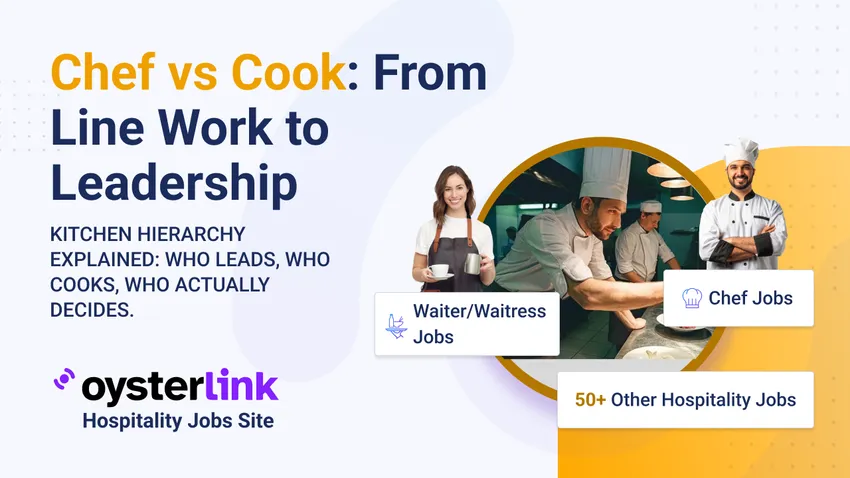Understanding Chef vs Cook is essential for anyone building a career in the kitchen.
Knowing the difference helps you map your career path—from the hustling line to running the entire kitchen.
What Is a Chef?
A professional Chef is a formally trained culinary professional responsible for menu creation, recipe development, and overseeing all kitchen operations.
They lead teams, maintain food quality, and shape the restaurant’s entire culinary identity.
Chefs must balance creativity with strong managerial and organizational skills. Their decisions influence the restaurant’s reputation, consistency, and profitability.
What Is a Cook?
A professional Cook focuses on preparing dishes by following established recipes and maintaining speed and consistency during service.
Their role is highly hands-on, involving chopping, cooking, plating, and maintaining workstation cleanliness.
While they don't lead the kitchen, they are essential for daily operations. Many Cooks use this role as the foundation to build experience for higher culinary positions.
Chef vs. Cook
The difference between a Chef and a Cook comes down to creativity, leadership, and responsibility. Chefs design the vision of the kitchen—Cooks execute it with precision.
Chefs manage menus, staff, inventory, and workflow, while Cooks focus on the technical execution of dishes.
Both roles are vital, but Chefs hold a significantly higher place in the leadership structure.
Kitchen hierarchy
Chefs sit at the top of the kitchen hierarchy, reporting only to the restaurant’s management and overseeing all culinary staff.
They assign tasks, ensure quality, and maintain the smooth flow of service.
Cooks operate mid-level, taking direction from Chefs and managing their own stations. Understanding this structure is key to career advancement in the culinary world.
Education
Most Chefs complete formal culinary programs or apprenticeships to gain advanced technique, discipline, and industry-ready skills.
Cooks, however, can often enter the field without formal education and learn directly through practical experience. This makes Cook roles a common starting point for aspiring Chefs.
Experience
Chef roles require several years of kitchen background, leadership experience, and proven culinary skill.
Many professionals begin as Cooks, gradually taking on more responsibility and mastering more complex techniques.
Cooks, however, can enter the industry with little to no experience depending on the establishment.
Specialty designations
Chefs can specialize in various roles such as:
- Executive Chef: Oversees multiple kitchens; handles budgeting and menu development.
- Head Chef: Leads the kitchen and manages all food preparation.
- Sous Chef: Assists the Head Chef and supervises staff.
- Pastry Chef: Creates pastries, desserts, and baked goods.
- Pantry Chef: Prepares cold dishes like salads and dressings.
- Commis Chef: Entry-level trainee handling basic prep tasks.
Cooks can also have different titles that relate to their responsibilities. Some of these roles include:
- Line Cook: Runs a specific station (grill, fry, sauté).
- Prep Cook: Preps ingredients and handles basic kitchen tasks.
- Short-Order Cook: Cooks quick meals in diners and fast-food settings.
Cook vs. Chef: Salaries
Chefs earn higher salaries due to their leadership responsibilities, creative influence, and advanced skill requirements.
With an average income of $62,640 per year, they play a major role in a restaurant’s success.
Cooks earn around $36,060 per year, reflecting their hands-on, production-focused tasks. Pay varies by state, experience, and the type of establishment.
Career Progression from Cook to Chef
Many culinary careers start in entry-level Cook roles, where individuals learn foundational techniques and kitchen operations.
With time, they take on more advanced stations, learn new skills, and gain confidence in a fast-paced environment.
Pursuing a culinary degree can accelerate advancement, but many Chefs rise through experience alone.
Eventually, Cooks can move into Sous Chef or Head Chef positions with enough skill and dedication.
What Skills Do Professional Chefs Need?
Chefs must combine culinary mastery with strong leadership and organizational skills. They create menus, manage staff, and oversee the entire cooking process.
Creativity is essential, as Chefs develop new dishes and keep menus fresh. Their ability to run an efficient kitchen directly impacts guest satisfaction and business performance.
What Skills Do Professional Cooks Need?
Cooks must excel at basic cooking methods, knife work, and recipe execution. They handle multiple tasks simultaneously and maintain speed and accuracy during high-volume service.
Attention to detail is crucial to ensure dishes come out consistent every time. Strong time management and communication help them keep pace in a busy kitchen.
Differences Between a Chef vs. Cook: Final Thoughts
Chefs and Cooks play different yet equally essential roles in the kitchen.
Chefs bring creative direction and leadership, while Cooks provide the technical execution that keeps service running smoothly.
Understanding the difference helps aspiring culinary professionals choose the right path forward.












Loading comments...